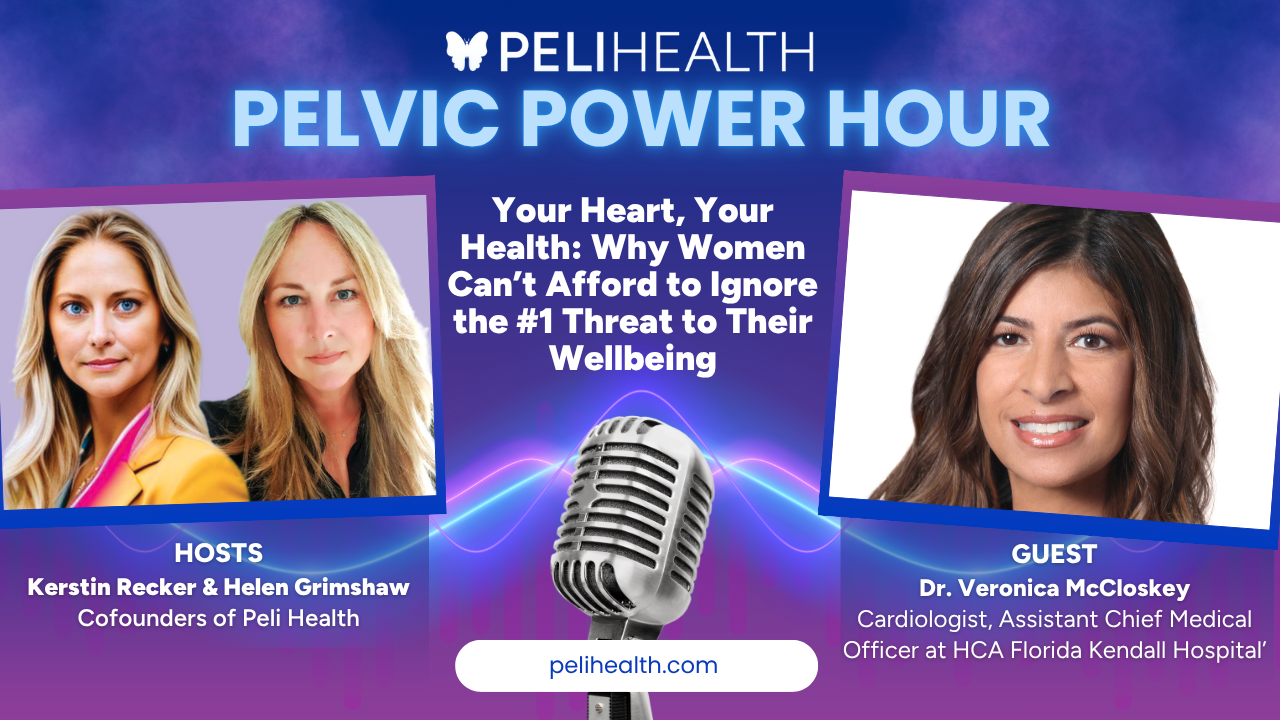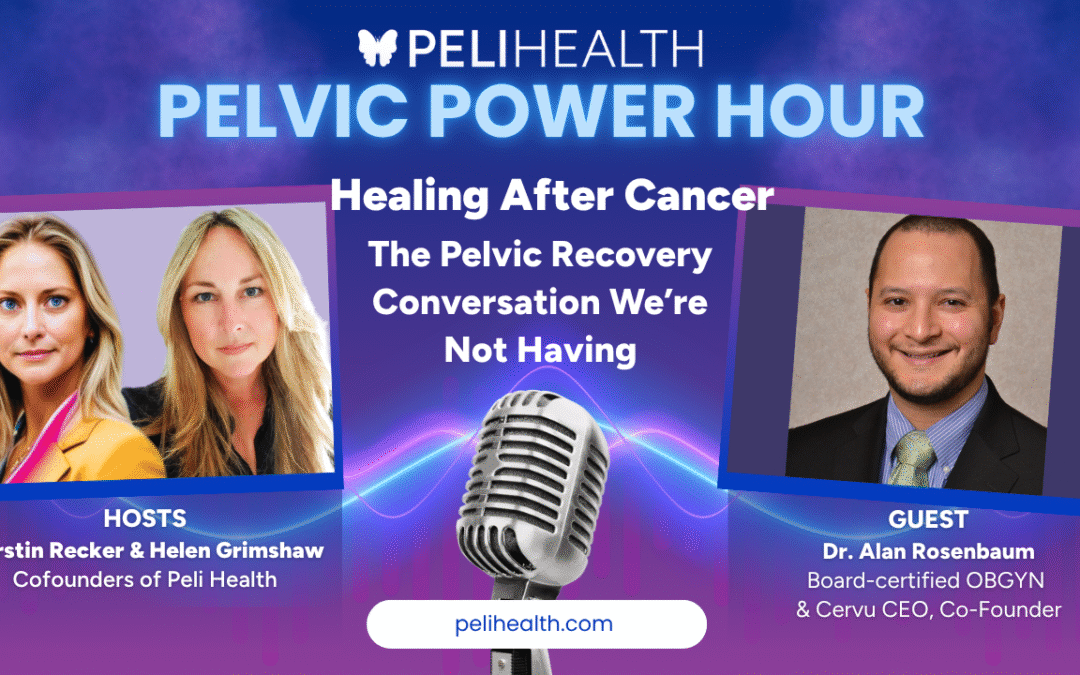Cardiovascular disease kills one in three women every year—more than all cancers combined. This on-demand Pelvic Power Hour with cardiologist and American Heart Association board member Dr. Veronica McCloskey reveals what every woman needs to know about prevention, early signs, and the surprising connections between heart and pelvic health.
Sign up now to access this on-demand episode, available December 4.
It’s time to take charge of the organ that powers everything else. You’ll receive the episode straight to your inbox upon release, so you can listen or watch when it fits your schedule.
NOT LIVE — JUST ON YOUR TIME. THIS ON-DEMAND EPISODE WILL BE SENT TO YOUR INBOX SO YOU CAN WATCH WHEN IT WORKS FOR YOU.
The truth: heart disease isn’t just a “men’s issue.”
Heart disease remains the number one killer of women in the United States, claiming the life of one woman every 80 seconds. Yet fewer than half of women even recognize it as their leading health threat.
Part of the reason is perception. We grow up hearing about heart attacks as something that happens to men in their 60s, not women juggling families, careers, and midlife transitions. But the reality is stark: more than 60 million American women are living with some form of cardiovascular disease.
And unlike men, women’s symptoms often don’t follow the textbook version. Instead of the “Hollywood” image of a man clutching his chest, women are more likely to feel shortness of breath, fatigue, nausea, dizziness, or pain in the jaw, neck, or back. Too often, these are dismissed as stress, anxiety, or exhaustion — and precious time is lost.
That gap in understanding can be fatal. But it doesn’t have to be.

Meet Dr. Veronica McCloskey
Dr. Veronica McCloskey is a board-certified cardiologist and the Chief Medical Officer at HCA Florida Westside Hospital, where she leads clinical quality, patient safety, and strategic medical initiatives to advance excellence in care across departments. With more than 20 years of experience, she brings deep expertise in cardiovascular medicine, hospital leadership, and women’s heart health.
A recognized voice in preventive cardiology, Dr. McCloskey also serves as President-Elect of the Board of Directors for the South Florida American Heart Association, where she champions awareness and innovation in women’s cardiovascular health.
Before her current role, she held multiple leadership positions within HCA, including Chief Medical Officer at HCA Florida University Hospital, Assistant Chief Medical Officer at HCA Florida Kendall Hospital, and Interim Chief Medical Officer at HCA Florida Mercy Hospital. She previously served as Chief of Cardiology for the cardiovascular prevention institute Healthy Heart at Cano Health and was a faculty member at both Columbia University’s Division of Cardiology at Mount Sinai Medical Center in Miami Beach and Northwestern University’s Feinberg School of Medicine in Chicago.
Dr. McCloskey earned her Bachelor of Arts in Natural Sciences from The Johns Hopkins University and her Doctor of Medicine from the University of Puerto Rico School of Medicine. She is board-certified in Cardiovascular Diseases and remains deeply committed to improving patient outcomes, empowering women through heart-health education, and leading with compassion and excellence in every facet of care.
Women’s hearts tell a different story — here’s what you need to know
1. Heart disease looks different in women.
Chest pain can happen, but many women experience more subtle symptoms — shortness of breath, extreme fatigue, or discomfort in the neck, jaw, or back. These can occur weeks before a cardiac event.
2. Hormones and menopause matter.
Estrogen helps protect the heart by supporting healthy blood vessels and cholesterol levels. As estrogen declines in perimenopause and menopause, risk rises — particularly if blood pressure, cholesterol, or blood sugar are creeping up too.
3. Stress is not “just stress.”
The constant emotional and mental load many women carry — caregiving, work, family — directly impacts cardiovascular health. Chronic stress increases cortisol and inflammation, both of which damage arteries and raise blood pressure.
4. Lifestyle is powerful medicine.
Dr. McCloskey shares that even small daily choices — 30 minutes of movement, improved sleep, and balanced nutrition — have measurable effects on risk. “You can’t change your genetics,” she says, “but you can absolutely influence your outcomes.”
5. Your pelvic health and heart health are connected.
Healthy blood flow supports everything from arousal and lubrication to core strength and bladder control. Cardiovascular health affects circulation throughout the body — including the pelvic region. A stronger heart means a stronger foundation for whole-body wellbeing.
Myths worth busting
One of the most dangerous misconceptions Dr. McCloskey addresses is that only older women need to worry about heart disease.
In truth, heart attacks among women under 50 are rising. Risk factors like autoimmune conditions, pregnancy complications, and hormonal birth control can all contribute to earlier-onset cardiovascular issues.
Other myths she dispels:
- “I exercise, so I’m safe.” (Even active women can have high cholesterol, hypertension, or a genetic predisposition.)
- “My doctor would tell me if something was wrong.” (Many risk factors go untested unless you ask.)
- “I’d know if my heart wasn’t healthy.” (You often won’t — until it’s advanced.)
Awareness is power. Prevention is freedom.
Why this episode matters
Too often, women only learn about their heart health after something goes wrong.
This conversation is about rewriting that story — shifting from reaction to prevention.
Dr. McCloskey breaks down the key screenings to request, how to interpret your numbers, and how to advocate for yourself if you feel brushed off. She also shares practical, realistic ways to care for your heart even with a full plate — because wellness shouldn’t feel like another job.
And because this is Peli Health, we’ll also explore how cardiovascular and pelvic health intersect: how movement, stress management, and hormone balance form the bridge between energy, intimacy, and long-term vitality.
Sign up to listen on demand — available December 4
Join Pelvic Power Hour: The Heart of the Matter with Dr. Veronica McCloskey and learn what every woman needs to know about her heart.
When you sign up, you’ll get the episode delivered directly to your inbox upon its release, so you can listen or watch whenever it fits your day.
Because understanding your heart isn’t just about avoiding disease — it’s about building a stronger, more connected, more powerful relationship with your body.
Follow @pelihealth for upcoming episodes, expert insights, and conversations designed to help you take charge of your health — from pelvic to whole-body care.
______


